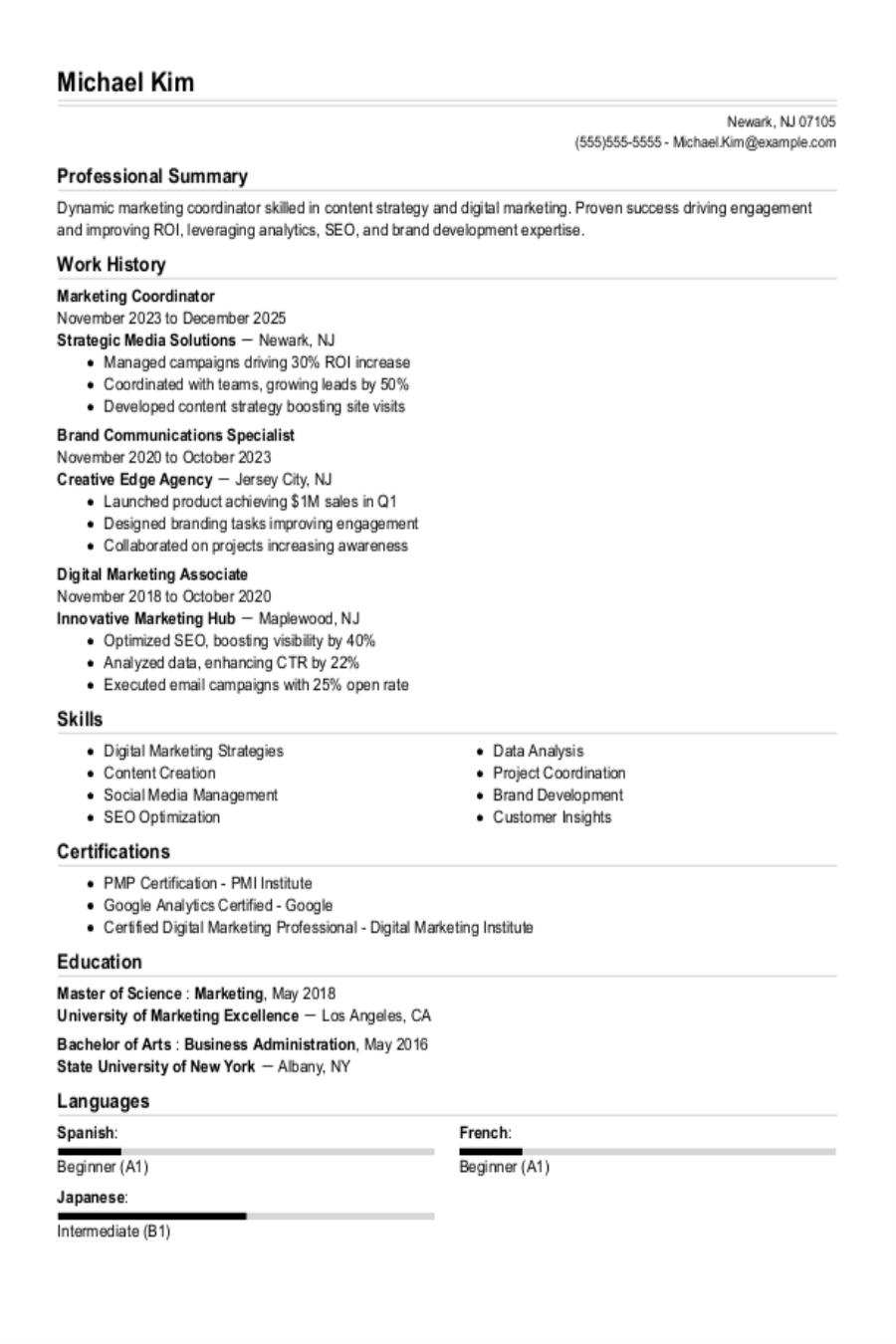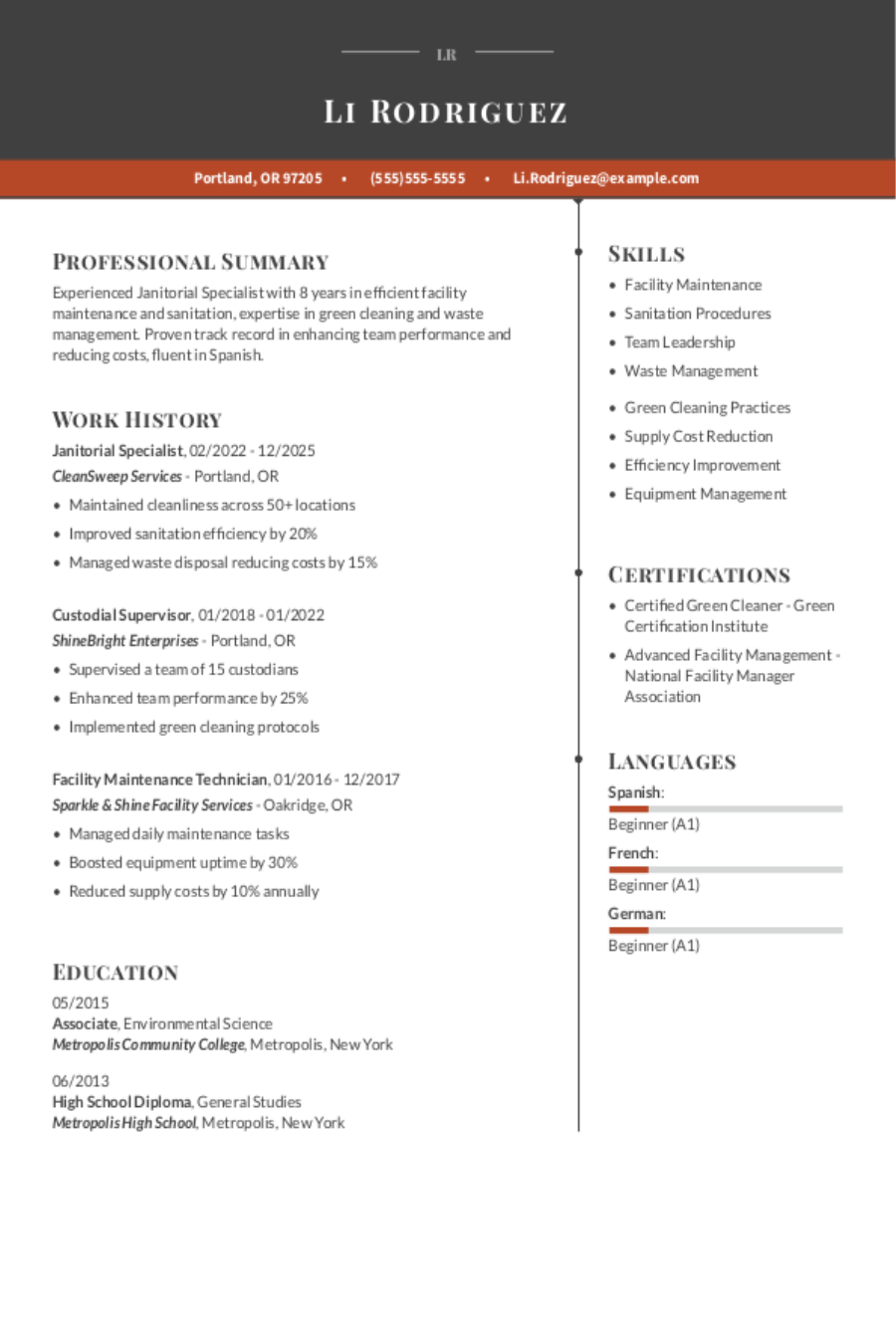Popular Programmer Resume Examples
Entry-level programmer resume
An entry-level resume for a programmer should focus on showcasing relevant projects, programming languages, technical skills, internships, and any certifications to highlight potential and enthusiasm for coding.
Focuses on goals: The job seeker demonstrates a strong focus on professional development, highlighted by their accomplishments in optimizing software solutions and mentoring peers, showcasing readiness to excel in programming roles.
Showcases education: The applicant highlights their education by placing their degrees near the top of the resume, allowing employers to see their expertise despite limited experience.
Mid-career programmer resume
A mid-career programmer's resume should emphasize a robust mix of technical expertise, project experience, and ongoing learning to effectively demonstrate their professional growth and adaptability in the tech industry.
Encourages quick scanning: A well-structured resume highlights the programmer's qualifications, making it simple for hiring managers to identify key skills and achievements quickly.
Includes mix of skills: This resume effectively highlights a mix of technical expertise and interpersonal skills, showcasing the applicant's prowess in software development alongside their ability to lead teams and communicate effectively.
Experienced programmer resume
An experienced programmer's resume should prioritize showcasing their technical skills, project contributions, and the evolution of their expertise in a clear and organized manner.
Embraces modern design: This modern resume template effectively showcases the programmer's innovative mindset, emphasizing their professional brand as a skilled problem solver and improving efficiency in high-impact projects.
Follows traditional format: The chronological resume format effectively highlights the extensive experience of the job seeker, clearly showcasing their career progression through specific roles and achievements that demonstrate growth and expertise in programming.
No experience programmer resume
A resume for an applicant with no experience should highlight relevant skills, personal projects, and any coding boot camps or online courses completed to showcase technical skill and enthusiasm for the field.
Draws from diverse experiences: Incorporating volunteer work and extracurricular activities helps this resume stand out by highlighting practical skills and teamwork, which are essential for a programmer with limited professional experience.
Favors clarity over complexity: The resume's clean and straightforward layout effectively highlights relevant programming skills and experiences, ensuring qualifications stand out without unnecessary distractions.
More resume examples
Programmer Resume Template
Looking for a way to present your skills? This programmer resume template serves as an excellent base—simply tailor it with your personal details and achievements.
David Garcia
Silverlake, WA 98293
(555)555-5555
David.Garcia@example.com
Professional Summary
Experienced programmer with 6 years in software development. Expert in optimizing code for performance and leading tech projects. Proven track record in enhancing user experiences and implementing innovative solutions.
Work History
Programmer
Tech Synergy Solutions - Silverlake, WA
March 2023 - September 2025
- Developed software reducing errors by 30%
- Optimized code resulting in a 15% performance boost
- Led a team of 5 in deploying key projects
Software Developer
Innovatech Industries - Tacoma, WA
January 2020 - February 2023
- Created apps improving user experience by 25%
- Implemented security measures enhancing safety
- Collaborated with design teams for UI/UX upgrades
Junior Developer
NexGen Software - Seattle, WA
January 2017 - December 2019
- Assisted in developing features reducing loading time
- Tested software ensuring compatibility with devices
- Participated in weekly project meetings, aligning goals
Skills
- Java programming
- Python scripting
- Database management
- Agile methodologies
- Web development
- Machine learning
- Software troubleshooting
- Version control systems
Education
Master of Science Computer Science
Stanford University Stanford, California
May 2016
Bachelor of Science Information Systems
University of California, Berkeley Berkeley, California
May 2014
Certifications
- Certified Java Programmer - Oracle
- AWS Certified Developer - Amazon Web Services
Languages
- Spanish - Beginner (A1)
- French - Intermediate (B1)
- Mandarin - Beginner (A1)
Must-Have Skills on a Programmer Resume
A strong skills section is important for standing out in today’s competitive job market.
IT and data professionals keep systems running and information flowing. The skills you highlight should reflect your ability to support complex processes, solve challenges, and contribute to smart, secure operations. Your resume is your opportunity to show how you enable efficiency, reliability, and informed decision-making.
The data below highlights the key hard and soft skills commonly found on programmer resumes, derived from extensive research by Resume Now.
When you're ready to improve your resume, check out our AI Resume Skills Generator. It will provide tailored suggestions for both hard and soft skills relevant to your programming career, ensuring a comprehensive skill representation.
Writing Your Programmer Resume
Having explored these effective resume examples, you are now prepared to dive into the detailed process of how to write a resume. We will walk you through each section step by step, ensuring you're equipped for success.
List your most relevant skills
An effective skills section on your programmer resume displays your technical expertise and relevant abilities. You should carefully analyze the job listing and incorporate specific keywords from the job listing that align with your skills.
By highlighting your skill in programming languages, frameworks, and tools mentioned in the listing, you demonstrate that you are a strong applicant for both human readers and ATS systems. Remember to balance technical skills with essential soft skills like teamwork and communication. Using keywords from the job listing effectively bridges the gap between what employers seek and what you offer, making your resume stand out.
Example of skills on a programmer resume
- Proficient in multiple programming languages including Python, Java, and C++
- Adept at developing scalable software solutions through agile methodologies
- Strong analytical thinker with a passion for debugging and problem resolution
- Excellent communicator fostering collaboration within diverse teams
Highlighting your soft skills on your resume can set you apart from other applicants. Employers greatly value interpersonal abilities, as they are often challenging to develop and can significantly improve team dynamics and productivity.
Highlight your work history
A strong work experience section should emphasize your achievements by demonstrating how you've applied your technical skills to solve problems and contribute to projects. Highlight quantifiable results, such as performance improvements or successful project completions, and include industry-specific keywords to make your resume stand out.
Ensure each job entry contains important details: your job title, the company's name, and the dates you were employed there. Alongside these details, focus on specific accomplishments that show your ability to deliver effective programming solutions.
Example of a programmer work experience entry
- Programmer
Tech Innovations Inc. - San Francisco, CA
January 2021 - Present - Develop and maintain software applications using Python and Java, resulting in a 30% increase in system efficiency
- Collaborate with cross-functional teams to define project requirements and deliver solutions on time, achieving a 95% project completion rate
- Implement code reviews and testing protocols that improved code quality by reducing bugs by 25%
- Mentor junior developers through hands-on training sessions and pair programming, improving team skills and productivity
- Optimize database queries which decreased load times by 40%, significantly improving user experience
Highlighting outcomes and achievements in your experience section is essential because it illustrates how you’ve added value to previous positions. Employers prefer concrete results over mere responsibilities, as this showcases your ability to innovate and solve problems effectively. By focusing on your successes, you not only demonstrate your skills but also position yourself as a strong job seeker in a competitive field.
Include your education
The education section of your programmer resume should list your academic credentials in reverse-chronological order, starting with the most recent degree. Include degrees, diplomas, and relevant certifications while omitting high school diplomas if you have achieved a higher education qualification. Highlight any honors or projects that demonstrate your skills to improve this section's effectiveness.
If you are currently pursuing a degree or your education is incomplete, it's important to indicate your highest completed level along with an expected graduation date. You can also include bullet points detailing relevant coursework or significant academic projects.
Common certifications for a programmer resume
- Certified Software Development Professional (CSDP) – IEEE Computer Society
- Microsoft Certified: Azure Developer Associate – Microsoft
- AWS Certified Developer – Associate – Amazon Web Services
- Oracle Certified Professional, Java SE Programmer – Oracle
Sum up your resume with an introduction
Creating a compelling profile section for your paralegal resume is important as it serves as your first impression on hiring managers. This section succinctly showcases your qualifications and sets the tone for the rest of your application, making it essential to grab attention right from the start.
If you have substantial experience in the legal field, consider using a professional summary. This format allows you to highlight significant achievements and relevant skills that demonstrate your suitability for advanced roles, making it easier for recruiters to see why you're a strong applicant at a glance. Those with less work experience might benefit from including a goal-driven resume objective to showcase their career plans.
Professional summary example
Innovative programmer with over 8 years of experience in developing scalable software solutions for diverse industries. Demonstrated success in improving application performance, optimizing user interfaces, and leading cross-functional teams to deliver projects on time. Proficient in multiple programming languages, database management, and agile methodologies.
Resume objective example
Enthusiastic programmer eager to use foundational skills in coding and problem-solving to improve software development projects. Committed to applying attention to detail and collaborative spirit to contribute effectively within a forward-thinking tech team.
As a programmer, it's important to keep your resume profile concise and packed with relevant information. Aim for no more than three sentences that highlight your most significant achievements and skills. You can save any additional details for your cover letter, where you have the opportunity to elaborate on your experience further.
Add unique sections to set you apart
Incorporating optional resume sections can set you apart as a programmer by showcasing your distinctive qualifications. These sections allow you to highlight aspects of your professional journey that might not fit into traditional categories.
Consider including relevant hobbies, such as coding side projects or participation in hackathons, which reflect your passion for technology. Additionally, volunteer work related to programming or mentoring can demonstrate your commitment to community and continuous learning. By sharing these experiences, you provide employers with a well-rounded view of who you are and the skills you bring to the table.
Three sections perfect for a programmer resume
- Technical Skills: Technical skills are essential on your resume as they demonstrate your expertise and ability to tackle specific challenges. Highlighting these skills helps potential employers understand your qualifications and how you can contribute to their team effectively.
- Tools and Platforms: Skill in computer skills is essential for programmers. Familiarity with coding languages, development environments, version control systems, and debugging tools improves efficiency and collaboration, driving successful project outcomes.
- Professional Certifications: Certifications validate your skills and dedication in programming. Pursue industry-recognized certifications to improve your resume and showcase your expertise to potential employers.
5 Resume Formatting Tips
- Choose a format that matches your career stage.
Choosing the right resume format is essential for showcasing your skills. If you're an experienced programmer, a chronological format highlights your career progression effectively.
For those just starting, a functional resume can emphasize your technical abilities and projects. Consider a combination format if you have both experience and relevant skills to showcase. - Pick a smart resume template.
To improve readability, opt for a professional resume template. This choice allows your qualifications to stand out clearly and makes formatting effortless. If you prefer designing your resume, ensure it remains clean and uses ATS-friendly fonts to increase your chances of passing automated screenings.
- Select an appropriate font.
Choosing a professional font can significantly improve resume readability. Fonts like Helvetica, Garamond, or Verdana are excellent options to ensure clarity for both ATS and hiring managers.
- Use consistent formatting.
Ensure your resume is consistently aligned and has uniform margins. This attention to detail creates a polished and professional look that stands out to employers.
- Keep your resume to one or two pages.
When crafting your resume, remember that resumes should be one page long unless you have extensive experience to showcase. Keep your content concise and relevant, highlighting only what matters most to potential employers.
What’s the Average Programmer Salary?
Programmer salaries vary based on location, career level, and qualifications.
This data, provided by the Bureau of Labor Statistics, will show you expected salary ranges for programmers in the top 5 highest-paying states, including the District of Columbia. The figures reflect the most current salary data available, collected in 2024.
- Full Range
- Most Common (25th–75th percentile)
- Average
Washington
Most common: $119,060 - $201,230
Tennessee
Most common: $66,520 - $215,580
Massachusetts
Most common: $99,800 - $139,950
California
Most common: $82,030 - $150,970
Oregon
Most common: $86,930 - $138,780
Tools for Your Job Search
Are you ready to launch your programming career? Before you hit send on that application, consider using our ATS Resume Checker. This powerful tool provides insights into how your resume performs with the automated systems many tech companies use for initial screenings, ensuring you stand out from the competition.
Looking to improve your resume further? Our AI Resume Builder offers tailored recommendations specifically designed for programmers. With professionally crafted templates, you can effectively showcase your coding skills and project experiences in a way that grabs hiring managers' attention.
Frequently Asked Questions
Last Updated: October 1, 2025
Absolutely. A cover letter is important as it adds depth to your resume and creates valuable opportunities for communication with employers. It allows you to express your enthusiasm for the role and highlight how your skills uniquely qualify you for the position. Don’t overlook this important part of your application—write a cover letter that truly represents you.
For a quick and effective solution, try our AI Cover Letter Generator. It helps you create tailored cover letters in just minutes, offering various cover letter template options that align perfectly with your resume, ensuring consistency in showcasing your professional journey.
A resume is a concise document, generally one to two pages long, that highlights your skills and work experience. In contrast, a CV (curriculum vitae) is more detailed and can span several pages, offering an in-depth look at your academic history, research contributions, publications, and overall professional journey.
You should use a CV when applying for specialized roles in academia or fields like law and medicine. If you're unsure how to create a compelling CV, our online CV Maker is the perfect solution! With various CV templates designed for different industries and career levels, you can easily craft a tailored document that stands out in any application process.
A programmer resume is typically best kept to one page, highlighting key skills and projects. However, if you have extensive experience or numerous relevant accomplishments, a two-page resume format may be appropriate for showcasing your qualifications effectively.
A common mistake programmers make is using overly complex resumes that ATS can't process. To avoid this, ensure your resume template is Ats-friendly and tailor it to match the specific job description for each application you submit.
Indeed, essential skills like "coding skill" and "problem-solving" are important on programmer resumes. It's beneficial to examine job descriptions for additional keywords and phrases that employers prioritize.
Was this information helpful? Let us know!
Leisha is a career industry editor dedicated to helping job seekers excel in their careers.
More resources

Best Resume Font for 2026 (+ Size and Formatting Tips)
Find the best resume font for your resume with our comprehensi...

How to Write a Resume: Guide & Examples for 2026
If you re wondering how to write a resume that grabs attenti...

Advertising Resume: Examples & Templates
As an advertising professional you need a resume that capture...

Marketing Coordinator Resume: Examples & Templates
As a marketing coordinator you need a resume that highlights ...

Janitorial Resume: Examples & Templates
As a janitorial professional you need a resume that highlight...


